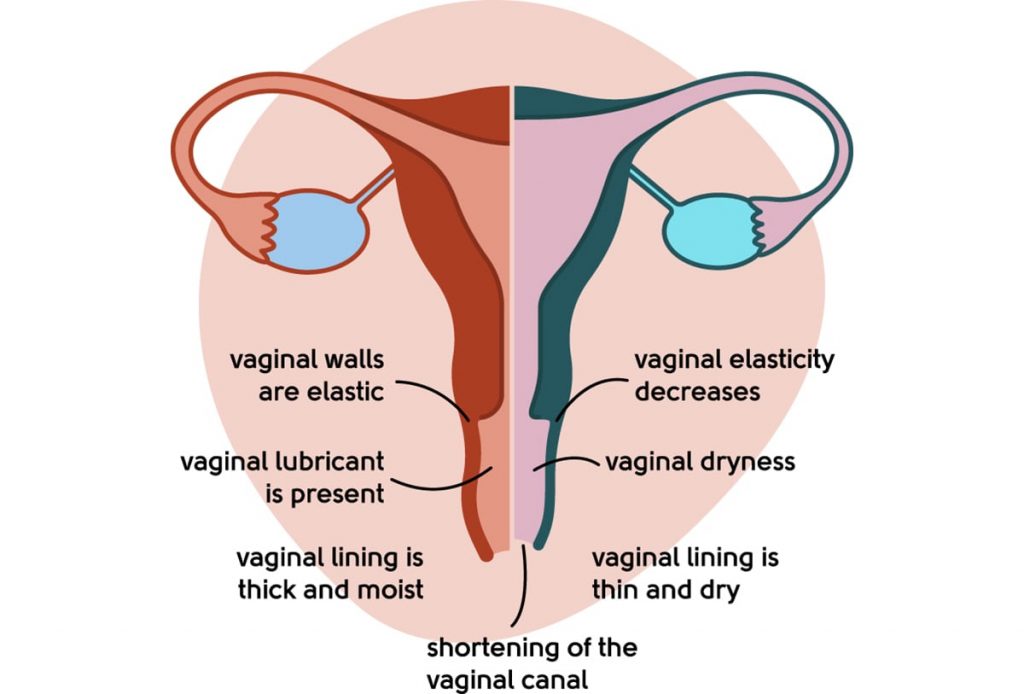
What is Vaginal Dryness?
Vaginal dryness refers to a condition where the vaginal tissues become dry, thin, and less elastic. This can cause discomfort and pain during sexual activity and can increase the risk of vaginal infections.
What Causes Vaginal Dryness?
Most cases of vaginal dryness are caused by a drop in estrogen levels, which can happen during menopause, nursing, or ovarian cancer therapy. Other than these, vaginal dryness can be brought on by taking certain medications, having an autoimmune illness, or engaging in risky lifestyle behaviors like smoking or douching.
Symptoms of Vaginal Dryness
Women often ask, what does vaginal dryness feel like? or what are the common symptoms of dry vagina?. Here are some most common symptoms:
- Itching or burning in the vaginal area
- Pain or discomfort during sexual activity
- Vaginal bleeding or spotting
- More frequent vaginal infections

Vaginal Dryness Diagnosis
Because there are a number of potential reasons of vaginal dryness, it is vital to speak with a medical professional about diagnosis and therapy.
It’s typical to have vaginal dryness due to a variety of factors.
- In the years leading up to menopause, a woman’s body generates less estrogen, which can cause vaginal dryness.
- Vaginal dryness can be a side effect of several medications, including antidepressants, anti-allergy drugs, and hormonal therapy.
- Vaginal dryness is a common side effect of nursing due to hormonal shifts.
- Vaginal dryness can be brought on by a number of medical issues, including Sjogren’s syndrome, vaginal infections, and endometriosis.
- Vaginal dryness can be caused by psychological causes such as stress and worry.
A doctor or other medical professional may inquire about the patient’s medical history and do a physical examination as part of the diagnostic process. A pelvic exam may also be done to look for anomalies like vaginal dryness. To get to the bottom of things, doctors may suggest a battery of tests, including bloodwork and imaging.
Best Remedies for Vaginal Dryness:
- Stay hydrated: Drinking plenty of water can help keep the body hydrated and may help reduce vaginal dryness.
- Use a lubricant: Lubricants can help reduce friction during sexual activity and ease discomfort caused by vaginal dryness.
- Avoid irritants: Avoid using products that can irritate the vaginal area, such as perfumed soaps and douches.
- Eat a healthy diet: A diet rich in omega-3 fatty acids, such as those found in fish, may help reduce vaginal dryness.
Top Natural Remedies for Vaginal Dryness

Best Herbs For Vaginal Dryness
Herbal remedies may be just as effective as modern therapies for vaginal dryness. Some potential medicinal plants include:
Black cohosh: may improve vaginal wetness due to its estrogenic characteristics.
Dong Quai: is a Chinese herbal remedy with a long history of usage. Because of the phytoestrogens it contains, it may improve vaginal lubrication.
Wild yam: also has phytoestrogens, which may improve vaginal wetness.
Clover, or red clover: is another herb that contains phytoestrogens that may aid in vaginal lubrication.
Evening Primrose Oil: Evening primrose oil includes gamma-linolenic acid (GLA), which may assist in enhancing vaginal moisture.
Aloe vera for vaginal drynes: Aloe vera has been utilized for its therapeutic benefits for millennia. It is well-known for its hydrating and calming characteristics, which can aid in relieving vaginal dryness.
Best Supplements For Vaginal Dryness
Vitamin E: Vitamin E is an antioxidant that can enhance vaginal lubrication by boosting blood flow to the region. It may also decrease inflammation and enhance vaginal tissue recovery. You can take vitamin E pills orally or use an oil or lotion containing vitamin E topically.
Omega-3 fatty acids: Omega-3 fatty acids have anti-inflammatory qualities and are present in fish oil and other sources. These may help minimize vaginal irritation and increase lubrication.
DHEA: DHEA is an adrenal gland-produced hormone that may alleviate vaginal dryness by raising estrogen levels. Before using DHEA supplements, it is essential to visit a healthcare professional, as they might have negative effects and interact with other drugs.
L-arginine: L-arginine is an amino acid that might boost vaginal sensitivity and blood flow, which may result in enhanced lubrication.
FAQS
Q: Can vaginal dryness be treated?
A: Yes, vaginal dryness can be treated. Treatment options may include hormone therapy, vaginal moisturizers, and lubricants.
Q: Can menopause cause vaginal dryness?
A: Yes, menopause is a common cause of vaginal dryness.
Q: Can medications cause vaginal dryness?
A: Yes, certain medications such as allergy and cold medications, antidepressants, and some cancer treatments can cause vaginal dryness.
Q: Can vaginal dryness be prevented?
A: It may not always be possible to prevent vaginal dryness, but staying hydrated, avoiding irritants, and eating a healthy diet may help reduce the risk.
Q: Hyaluronic acid for vaginal dryness really works?
A: Hyaluronic acid may be helpful in alleviating vaginal dryness by increasing moisture and promoting tissue hydration.
